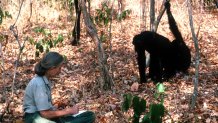What to Know
- Wildlife expert Dr. Jane Goodall has died at 91 at her Los Angeles-area home, according to the Jane Goodall Institute.
- Goodall was 26 when she traveled to Tanzania from England to conduct what became a pioneering study on chimpanzees, their social structures and the tools they make and use.
- Her decades in the wild changed how humans perceived their closest living biological relatives.
- She went on to become a fierce advocate for animals and the environment, speaking and educating at events around the world.
- In a statement, the Jane Goodall Institute said the famed primatologist died of natural causes.
British primatologist and anthropologist Dr. Jane Goodall, whose groundbreaking research led to a better understanding of chimpanzees in the wild, has died at age 91, according to the Jane Goodall Institute.
In a statement, the Institute said the famed wildlife expert died of natural causes.
Police and firefighters responded to a medical call at her Los Angeles-area home at about 8:30 a.m. Wednesday. No foul play is suspected, authorities told NBC4 Investigates.
Goodall was in Southern California for a nationwide speaking tour.
“The Jane Goodall Institute has learned this morning, Wednesday, October 1, 2025, that Dr. Jane Goodall DBE, UN Messenger of Peace and Founder of the Jane Goodall Institute has passed away due to natural causes,” the Institute said in a statement. “She was in California as part of her speaking tour in the United States. Dr. Goodall’s discoveries as an ethologist revolutionized science, and she was a tireless advocate for the protection and restoration of our natural world.”
Goodall, who was scheduled to speak Friday at UCLA Royce Hall, is best known for a decades-long study of wild chimpanzees in Tanzania. She is considered the world’s top expert on the animals and their complex social structures.
Born in London in 1934, Goodall said she was interested in animals at an early age. In her book “In the Shadow of Man,” she recalled hiding in a henhouse to watch a chicken lay an egg.
She took a secretarial course in her late teens, then traveled to a farm in Kenya owned by a friend’s parents where she met anthropologist and paleontologist Louis Leakey at a natural history museum. He hired her as an assistant secretary and asked if she was interested in studying chimpanzees.
Primatologist Jane Goodall died, the Jane Goodall Institute announced on Facebook
Goodall was 26 when she traveled to Tanzania to conduct the landmark study in the forest of Gombe. Goodall weathered some early setbacks, including what she believed was a bout with malaria, and eventually the chimpanzees accepted her presence.
She immersed herself in the habitat of the region’s chimpanzees to better understand how they interact and form bonds. In 1960, she discovered chimpanzees make and use tools, marking a significant revelation in wildlife research.
Her decades in the wild changed how humans perceived their closest living biological relatives. It was previously believed that only humans made and used tools.
“Out there in nature by myself, when you’re alone, you can become part of nature and your humanity doesn’t get in the way,” she told The Associated Press in 2021. “It’s almost like an out-of-body experience when suddenly you hear different sounds and you smell different smells and you’re actually part of this amazing tapestry of life.”

041816 03: Scientist Jane Goodall studies the behavior of a chimpanzee during her research February 15, 1987 in Tanzania. (Photo by Penelope Breese/Liaison)
Instead of limiting herself to making observations, Goodall interacted with the chimps, feeding them and giving them names. Her findings reached a global audience in 1963 when she first appeared on the cover of National Geographic ahead of the release of a documentary.
Goodall’s revolutionary findings included discoveries about how chimpanzees experience emotions, their individual personalities, mother-baby bonds and a social structure.
The research set Goodall on a path to becoming the world’s foremost primatologist. She founded the Jane Goodall Institute in 1977 to back research in Gombe and support chimpanzee populations throughout Africa.
Goodall was based in the coastal resort town of Bournemouth, England, but traveled the world year-round to speak and educate. The 2013 Tournament of Roses grand marshal was a vocal advocate for animals and the environment.
Goodall was awarded the Presidential Medal of Freedom in 2025 by then-U.S. President Joe Biden. She won the prestigious Templeton Prize in 2021.
Goodall, the author of several books, was named a United Nations Messenger of Peace.
In a post on X, the United Nations said, “Today, the UN family mourns the loss of Dr. Jane Goodall. The scientist, conservationist and UN Messenger of Peace worked tirelessly for our planet and all its inhabitants, leaving an extraordinary legacy for humanity and nature.”

Allison Craig is a passionate sports writer and analyst with a deep love for game strategies, player performances, and the latest trends in the sports world. With years of experience covering football, basketball, tennis, and more, she delivers insightful analysis and engaging content for sports enthusiasts.


No responses yet